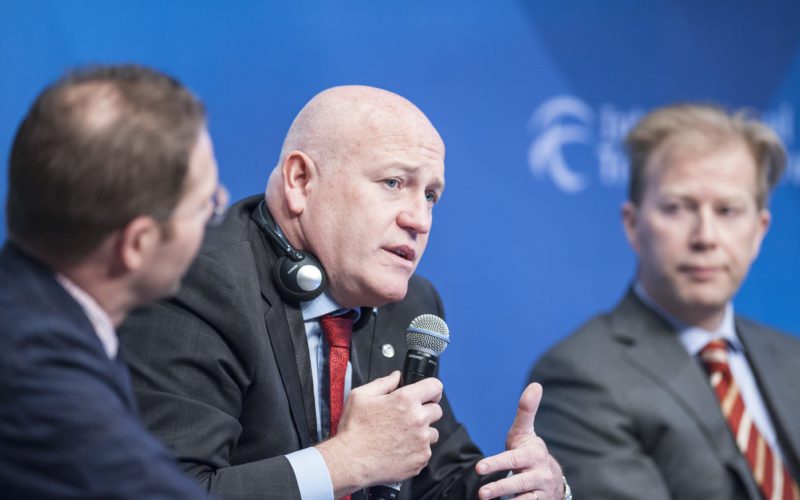(SHARM EL SHEIKH, Egypt) — A new action plan, launched at COP 27 by United Nations organizations, shipowners and unions, sets out recommendations to upskill seafarers to meet shipping’s decarbonization goals. The plan is in response to findings from new research, the modeling of which cautions that as many as 800,000 seafarers will require additional training by the mid-2030s.
Currently accounting for 3 percent of global emissions, shipping needs to transition away from conventional fuels toward alternative low- and zero-carbon fuels and technologies to meet the world’s target of keeping global warming to 1.5 Celsius or less by 2050.
The three emission-reduction scenarios assessed in the research highlight an immediate need to start putting the training infrastructure in place, to ensure hundreds of thousands of the world’s nearly 2 million seafarers are upskilled and empowered through the transition.

Findings also suggest that a lack of certainty on alternative fuel options is having knock-on effects for seafarer training, as the global maritime community works toward a clearer decarbonization pathway in a post-fossil fuel era.
The research was conducted by leading maritime consultancy DNV and commissioned by the Maritime Just Transition Task Force secretariat. The Maritime Just Transition Task Force was formed to ensure that shipping’s response to the climate emergency puts seafarers and communities at the heart of the solution
In response to the training challenge that the modeling lays bare, the action plan makes recommendations for industry, governments, seafarer unions and academia (including training providers). These recommendations include:
• Strengthening global training standards
• Ensuring a health-and-safety-first approach
• Establishing advisory national maritime skills councils
Views from seafarers and their unions
“All three scenarios DNV identified require some form of retraining the workforce,” said Stephen Cotton, secretary-general of the International Transport Workers’ Federation (ITF). “The good news is that seafarers are prepared and willing to be part of this transition. But crew want to know that the fuels they’re handling are indeed safe, and that we as an industry have the training pathways established to upgrade their skills. Seafarers and other maritime workers are already feeling the effects of an unstable climate — dry unnavigable rivers, soaring ocean surface temperatures, shutdown ports with heat waves and flash floods.”
“As seafarers, we see climate change happening,” said Cleo Bierneza, a seafarer from the Philippines working aboard cargo ships. “Some voyages get very hot nowadays for crew on board, and in some places of the world the weather will change extremely, without warning. It didn’t used to be like that. I would like maritime to reduce our own carbon if we can, so crew can have a more stable climate to work with. I am excited for a just transition, because we can make seafaring an even better job and hopefully bring in more women to become seafarers.”
Biernaza is a member of AMOSUP, a seafarers’ union affiliated with the ITF. AMOSUP has been engaged at various levels in the development of the global union federation’s sustainable shipping policy.
Views from shipowners
“There is an urgent need to establish the infrastructure and training required to prepare our seafaring workforce, both in developed and developing countries, to help meet our decarbonization objectives,” said Guy Platten, secretary-general, International Chamber of Shipping. “This should be done as of today, so they are ready and able to meet the challenges that new green fuels and propulsion technologies will pose and mitigate any potential health and safety risks for ships, communities, the environment and seafarers themselves. This is an opportunity for all so that no one is left behind. Shipping cannot decarbonize without its workers, and the 10-point action plan developed by the task force maps out a pathway for how this can be achieved, as our industry continues to navigate toward a decarbonized future.”
“As shipowners and operators we must recognize that we cannot achieve a green transition without our seafarers,” said Karin Orsel, CEO, MF Shipping. “Shipping has an opportunity to be a leader in the creation of a just green transition, in which we invest in the training and upskilling of our workforce, create decent job opportunities for all, not just for the few, raise work standards, tackle safety concerns, and ensure diversity issues are addressed from the outset. This is good business sense, this is ethically and morally the right thing to do, and importantly, if we embed just transition practices into our operations from the outset, we will as an industry have a stronger chance of meeting our global carbon reduction targets.”
DNV: New technologies not without risk
Knut Orbeck-Nilssen is the CEO of DNV Maritime, the leading maritime consultancy that was commissioned by the task force to undertake the research.
“Decarbonization is bringing new opportunities, new technologies but also new risks,” he said. “Our first priority must be to achieve safe decarbonization. We must take a collaborative approach to safeguard our people, our ships and our environment. This report points to the challenges and the tangible actions the industry can take to support and protect its workforce. DNV is pleased to see the action plan led by the task force and recognize the challenge moving forward to train seafarers on alternative fuel technologies.”
Global community supportive of action
“Climate action focused on people and job creation must be a the core of a just transition to net zero,” said Sanda Ojiambo, assistant secretary-general and CEO of the U.N. Global Compact. “This new paper highlights that aligning with a 1.5 C trajectory requires action now to support the upskilling of the maritime workforce as the shipping industry moves to rapidly cut its greenhouse gas emissions. The action-plan represents a global first — it marks the first business sector uniting in a tripartite framework — shipowners, seafarers’ unions and U.N. organizations — to discuss how to secure a just transition together.”
“Climate change is a global issue that requires a global response,” said Kitack Lim, secretary-general of the International Maritime Organization. “We must use every tool available to decarbonize the maritime sector. Alternative fuels and green technologies can help meet emission reduction targets. This cannot happen without the people who will be at the heart of implementing shipping’s decarbonization journey. It is clear that seafarers must have the appropriate training for a smooth transition to a greener future. This is something that will be in sharp focus as IMO works on its comprehensive review of the STCW Training Convention.”
– International Transport Workers’ Federation

